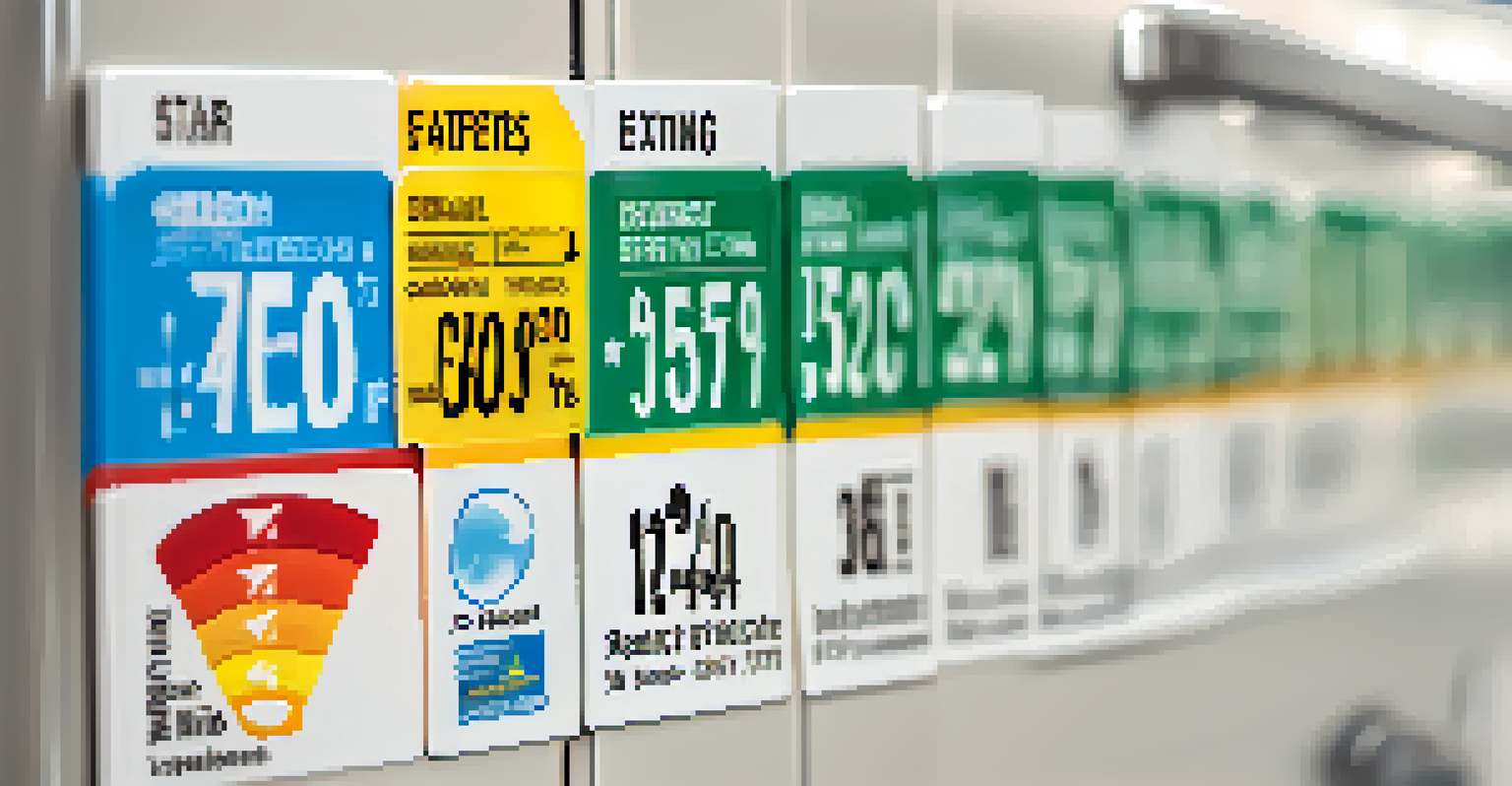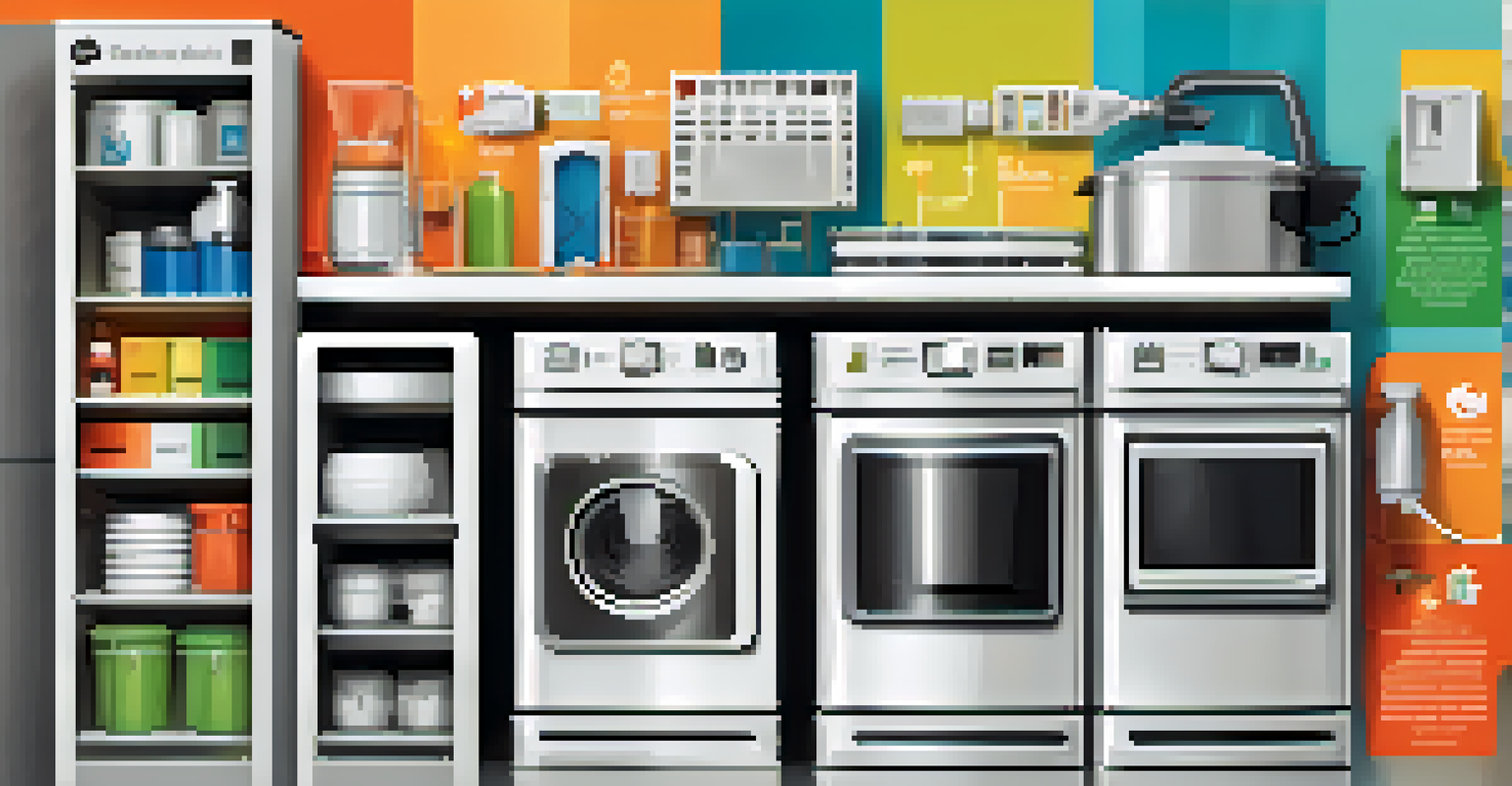How to Select Energy-Efficient Kitchen Appliances

Understanding Energy Efficiency Ratings and Labels
When shopping for kitchen appliances, it's crucial to understand energy efficiency ratings. These ratings, often found on labels like Energy Star, indicate how well an appliance uses energy compared to similar models. Look for appliances with higher ratings to ensure you're making a sustainable choice.
Energy efficiency is not just a cost-saving measure; it is a way to protect the environment and ensure a sustainable future.
For example, an Energy Star-rated refrigerator typically uses 15% less energy than standard models. This can translate to significant savings on your electricity bill over time. Familiarizing yourself with these labels can help you make informed decisions that benefit both your wallet and the environment.
Don't hesitate to ask sales representatives about the energy efficiency of products. They can provide additional insights into which models offer the best performance while keeping energy consumption low.
Consider the Size and Capacity of Appliances
Size matters when it comes to energy-efficient appliances. A larger appliance may seem appealing, but if it's not necessary for your cooking habits or family size, it can lead to wasted energy. Choosing the right size ensures that you're not overusing energy for more space than you require.

For instance, a small family may benefit from a compact dishwasher instead of a full-size model. This not only saves energy but also minimizes water usage. Assess your needs carefully before making a purchase to ensure you select the appropriate size.
Choose Energy-Efficient Appliances
Selecting appliances with high energy efficiency ratings, like Energy Star, helps save money and reduce environmental impact.
Always measure your kitchen space and consider how often you cook. This will help you choose appliances that meet your needs without excess energy consumption.
Research Different Appliance Brands and Models
Not all brands are created equal when it comes to energy efficiency. Some manufacturers prioritize sustainability and offer appliances designed to minimize energy consumption. Take the time to research various brands and read reviews from other customers to see which models consistently perform well.
The greatest threat to our planet is the belief that someone else will save it.
Comparing models from different brands can reveal significant differences in energy usage. For example, some ovens may feature eco-friendly settings that reduce energy consumption during cooking. Knowing which brands lead in energy efficiency can help you narrow down your options.
Additionally, consider visiting stores to see the appliances in person. This allows you to assess build quality and features that may enhance energy savings.
Evaluate Features That Enhance Energy Efficiency
Modern kitchen appliances often come with features designed to boost energy efficiency. For example, induction cooktops are known for their quick heating capabilities, which can significantly reduce energy consumption compared to traditional gas or electric cookers. Look for features like these when selecting new appliances.
Another example is dishwashers that have eco-friendly cycles designed to use less water and energy. These settings can help you save on utility bills while still getting your dishes clean. Always check the specifications for features that promote efficiency.
Consider Size and Features Wisely
Choosing the right size and features for your appliances ensures optimal energy usage and meets your cooking needs.
Keep in mind that while some features may have a higher upfront cost, they can lead to long-term savings on your energy bills. Choosing appliances with advanced energy-saving features is an investment in both your home and the environment.
Compare Energy Consumption Estimates
Many appliances come with estimated annual energy consumption figures, often found on their labels. These estimates provide valuable insight into how much energy you can expect to use over the year. Comparing these figures across different models can help you make a more informed decision.
For instance, you might notice that one refrigerator uses 400 kWh per year, while another uses 600 kWh. Over time, that difference can add up to significant savings. It's also helpful to calculate the estimated cost of running each appliance based on your local energy rates.
This approach not only helps you choose appliances that save money but also encourages you to be mindful of your energy consumption habits in the kitchen.
Look for Rebates and Incentives for Energy-Efficient Models
Many governments and utility companies offer rebates or incentives for purchasing energy-efficient appliances. These programs are designed to encourage consumers to make eco-friendly choices. Before finalizing your purchase, check for any available rebates that could help offset the cost of your new appliance.
For example, you might find that buying an Energy Star-rated washing machine qualifies you for a rebate of up to $100. This can make a significant difference in your overall spending. Additionally, some utilities may offer special programs or discounts for using energy-efficient appliances.
Take Advantage of Incentives
Look for rebates and incentives from governments and utilities to lower the cost of energy-efficient appliances.
Taking advantage of these incentives not only saves you money but also supports broader efforts toward energy conservation in your community.
Plan for the Long-Term: Lifespan and Durability
When selecting kitchen appliances, consider their lifespan and durability. Higher-quality appliances may have a higher initial cost but often save money in the long run due to fewer repairs and replacements. Investing in durable appliances means you'll enjoy their benefits for many years, maximizing your energy savings.
For instance, a well-made refrigerator can last over a decade, while cheaper models might need replacing sooner. Factor in the longevity of your choices when evaluating your options, as this can impact your overall energy consumption and budget.

Always read product warranties and reviews to gauge how well appliances stand the test of time. This consideration ensures you choose appliances that are not only energy-efficient but also reliable.
Understanding the Environmental Impact of Your Choices
Selecting energy-efficient kitchen appliances isn't just about saving money; it's also about making a positive impact on the environment. By choosing appliances that consume less energy, you contribute to reducing greenhouse gas emissions and conserving natural resources. This holistic approach benefits both your home and the planet.
For example, using an energy-efficient oven not only decreases your energy bill but also reduces the overall demand for electricity, which can lead to less reliance on fossil fuels. Understanding this connection can motivate you to make responsible choices.
As you make your selections, think about the legacy you want to leave behind. Investing in energy-efficient appliances is a step towards creating a more sustainable future for generations to come.